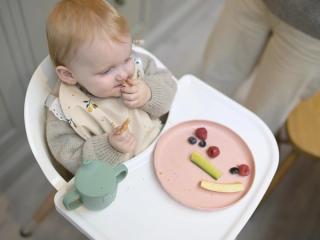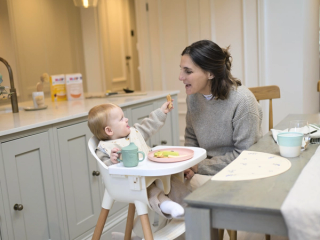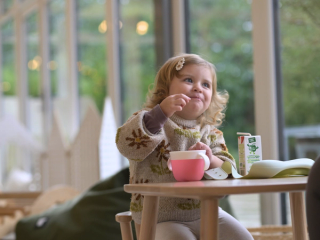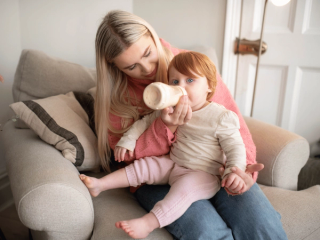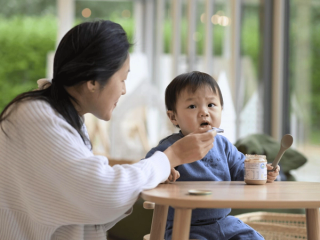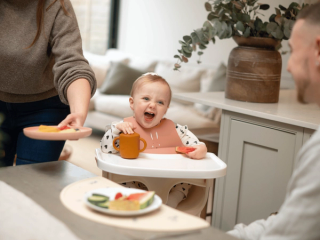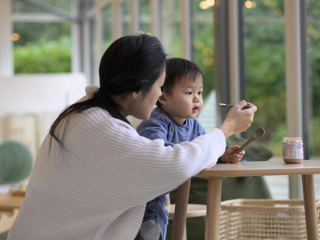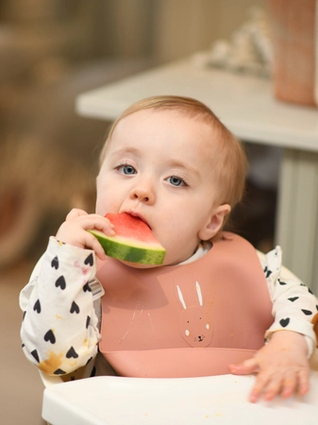
- Home
- Advice Hub
- Toddler
- Toddler Feeding
- Toddler Nutrition
Toddler nutrition
Things don’t change dramatically when your baby turns one and becomes a toddler, but here are some new things to think about.
Things don’t change dramatically when your baby turns one and becomes a toddler, but there are some new things to think about. Rather than the food, this article focuses on some of the themes of feeding, which are spoken about less and may be helpful.
Growth and appetite
One of the biggest changes that happens when your baby turns one is that growth slows down. When this happens, you may see a reduction in appetite as not as much is needed to fuel the previous rapid growth.
Many parents worry at this stage that their baby has become fussy if meals are no longer being finished. You may also see a lean towards eating favourites off of the plate and not finishing everything else, which is very normal – babies eat when they are hungry and stop when they are full. If their body is saying, don’t eat as much of this food, they will eat the things they like first and simply stop when they are satisfied.
As long as your baby is satisfied after meals, and they carry on growing well you don’t need to worry.
Fussy eating
A very normal part of development for many toddlers is fussy eating. It probably doesn’t make it any less frustrating for you, but hopefully helps you feel a little less isolated to know that up to 40% of children go through this phase and around 25% of children refuse at least one food every single day.
There are many reasons why fussy eating happens, and there is lots you can do work through it. The first thing for you to know is that YOU are not responsible. You haven’t caused it. If you are holding onto guilt and self-blame, we’d love you to start letting go of that.
Sugar
You may find that as your little one becomes more aware of others around them, and they become more inquisitive, that they start to become more interested in eating high sugar foods that other children are having. Don’t be alarmed if there is a sudden desire to eat those kinds of foods more regularly.
The best thing you can do is to keep a neutral attitude towards these foods; be aware that too much may lead to increased weight gain and can damage the teeth, but also that sugar is not in itself harmful.
Regularly offering very small amounts of foods like biscuits, cake, chocolate or ice cream alongside other foods will help to make them less exciting and means your child is less likely to develop an obsession.
Salt
It is still important to keep the salt content of your child’s diet low. If like lots of parents you’ve found yourself being a bit more relaxed about foods like crisps or you are using lots of jarred sauces or flavourings in cooking, try to look for lower salt varieties or give smaller portions of these foods alongside some cooked vegetables or fruit to lower the overall salt content of a meal.
Structure
Now that snacks are being introduced, having a good structure of three meals a day, two healthy snacks (usually mid-morning and mid-afternoon) and milk a couple of times a day works well for most children. Try not to let your child fill up on foods or milk throughout the day, as this will make them less likely to eat meals.
You can read more about when to give your little one snacks here!
Bottle use & teeth
The NHS recommends stopping the use of bottles at 12 months. This is to protect the teeth as there are links between extended bottle use and dental caries (tooth decay) in children. As tooth extractions are the number one reason for admissions to hospital for children in the UK, it’s something that needs to be taken into account.
As parents ourselves we understand it isn’t always easy to just stop at 12 months as the bottle offers comfort to your baby. If you don’t feel it is possible to simply take the bottle away there are some things you can think about.
- Are there bottles that your baby particularly enjoys, or relies upon for comfort or sleep? On the flip side, are there bottles that you give which feel more habitual from your side or ones that your baby doesn’t seem so attached to? Pick your battles and switch the less required bottles to a sippy cup and offer a snack instead, which includes some dairy so that you can feel confident your little one is still getting the nutrition they need.
- Ensure you brush your baby’s teeth after a night time bottle. This might be difficult at first if they fall asleep with it. But switching up your night-time routine will help to protect your baby’s teeth.
Activity
Although it might not feel completely relevant to nutrition, physical activity is very much part of the picture and the two are linked with each other. Laying down the foundations of being physically active is really important during toddlerhood because this is a time where children are learning so many skills – motor skills, balance, coordination and other skills related to the body. Beyond that though, being involved in active play is how children learn many of their social skills too.
There’s lots of research1 to show that toddlers that are doing lots of active play tend to grow into older children that continue to be active; so it’s worth getting your little one moving as much as possible as it means they’re more likely to continue it when they get older.
In the UK only 9% of 2-4 year olds are doing the recommended 180 minutes of active play each day, which is really very low! What counts as active play? Anything play- based that uses the large muscles in the body, so things like running, catching, skipping and jumping.
Advice & tips

Want to read more? Join the HiPP BabyClub for full access to this article.
As a BabyClub member, you'll get access to a range of exclusive benefits, including:
Monthly competitions
Discounts from our Partners
Expert advice tailored to your little one's age
Weaning recipes
HiPP shop discounts*
*10% off HiPP's online shop does not apply to our First Infant, Anti-Reflux or Comfort Formula Milk.
Important notice: Breastfeeding is best. Follow on milk should only be used as part of a mixed diet from 6 months. Talk to a healthcare professional.




